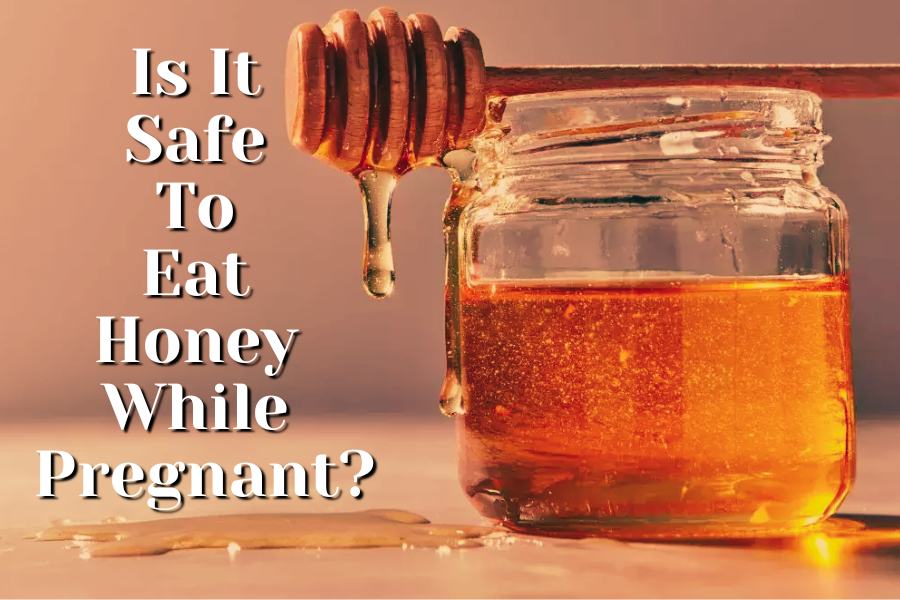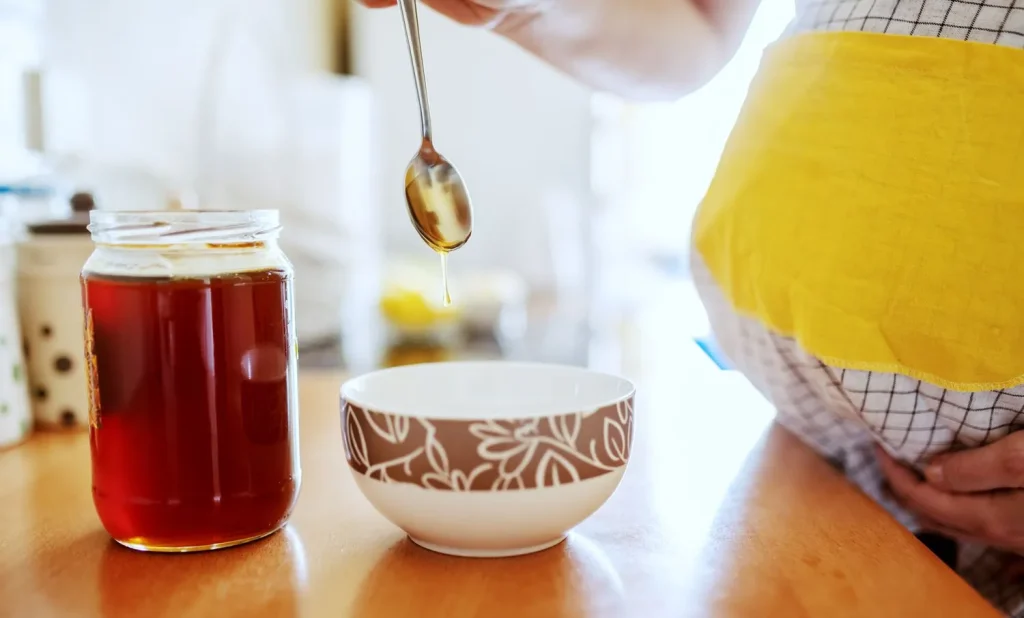
Honey is sweet and delicious. But is it safe to eat honey while pregnant? This is a common question for many pregnancies. The concern primarily arises from the risk of botulism, caused by bacteria found in some foods, including honey. While botulism can be harmful to infants, the question remains whether it poses a risk to pregnant women and their unborn children.
By looking at scientific research, we can clarify whether honey is a safe addition to a pregnant woman’s diet. We’ll explore the safety of eating honey while pregnant, dispel common myths, and provide practical advice for expectant mothers.
Is It Safe To Eat Honey While Pregnant?

Yes, honey is safe to consume while getting pregnant. You might have heard that honey isn’t recommended for babies under 1 year old, but this doesn’t apply to pregnant women. The concern for infants revolves around a bacteria called Clostridium botulinum. This bacteria can sometimes be found in honey and can produce harmful toxins for babies.
Even if a pregnant woman were to get botulism from honey, studies suggest it’s highly unlikely to harm the fetus through the placenta.
“The body’s natural defenses typically stop the bacteria from multiplying, making it safe for adult consumption,” says Melissa Dean, the founder of Casa Natal Birth and Wellness Center, San Francisco.
What Kind of Honey Is Safe During Pregnancy?
Honey generally gets a thumbs-up from pregnant women, but there are still some factors to consider when choosing which type to enjoy:
Raw Honey
Raw honey is straight from the beehive, so it is in the most natural state. It is extracted from the honeycomb and then filtered through a mesh or cloth sieve to remove large bits like beeswax and bee parts. It’s not heated to like pasteurized honey.
Raw honey contains more antioxidants and potentially beneficial bacteria. But, it might also harbor the Clostridium botulinum spores that can be harmful to babies under 1 (and are harmless to adults). For this reason, raw honey is generally not recommended during pregnancy.
Pasteurized Honey
Pasteurized honey is heated to eliminate bacteria and impurities, making it the safest option for pregnancy. This type is readily available in most grocery stores. But pasteurization can also affect the taste and texture of honey slightly. Pasteurized honey may have a milder flavor and a smoother consistency compared to raw honey.
The main benefit of pasteurized honey is its safety. It’s a good choice for everyone, including pregnant women and infants. Additionally, pasteurization helps the honey stay fresh for longer periods.
Organic Honey
Choosing organic honey ensures it’s free from pesticides and other unwanted chemicals.
Benefits of Using Honey While Pregnant

Honey offers a range of potential benefits for pregnant women as below:
- Reduced inflammation
- Antibacterial properties
- Improved wound healing
- Digestive support
- Natural energy source: Honey provides quick energy, particularly helpful during pregnancy when fatigue is common.
- Soothing sore throat: Honey’s antibacterial properties might offer some relief from a sore throat, a common pregnancy discomfort.
- Antioxidant boost: Raw honey may contain more antioxidants than pasteurized honey. Antioxidants help fight cell damage.
Small tip: A cup of warm milk with honey can help to improve your sleeping during pregnancy.1
How Much Honey Can A Pregnant Woman Eat?
Honey can be a healthy choice for pregnant women, but moderation is important. Because honey is naturally sweet, consuming too much can lead to weight gain and other health problems. Even though it’s a better option than processed sweeteners, honey can still cause blood sugar spikes. How to take honey during pregnancy? To maintain good blood sugar levels, limit your daily intake to 1 or 2 tablespoons.
Some Precautions For Using Honey During Pregnancy
Whether honey is safe to eat while pregnant, pregnancies with the below conditions should use it with precautions:
Gestational Diabetes
If you’ve been diagnosed with gestational diabetes, you might need to adjust your diet. It’s important to remember that honey breaks down into simple sugars, just like other carbohydrates. This means it will raise your blood sugar levels similar to other sugary foods2.
Those managing gestational diabetes through carbohydrate counting should be more careful. Be aware that 1 tablespoon of honey contains about 17g of carbohydrates, with roughly 5g per teaspoon.
To minimize the impact on your blood sugar, try pairing honey with a source of protein or fiber. This can help slow down the effect on your bloodstream.
Gastrointestinal conditions

For pregnant women already struggling with acid reflux, heartburn, or indigestion, honey might not be the best choice. It can aggravate these symptoms. You should drink a lot of fluids such as water, clear soups, or fruit juice. Moreover, a healthy diet with a high amount of fiber can help. Fiber can help to regulate your digestion work and prevent constipation. Good sources of fiber can be found including vegetables, fruits, and whole grains. Sugary and processed foods are something you should stay away from.
Antibiotics
Powerful antibiotics can disrupt the good bacteria in your gut, which are crucial for fighting off harmful spores. If you’re on or just finished antibiotics, talk to your doctor about temporarily limiting honey intake.
Enjoying honey while pregnant is safe and can be a delicious addition to your diet. Although honey is not recommended for infants under 1 year old, this risk does not extend to pregnant women. Your digestive system is capable of handling any potential bacteria, ensuring that both you and your baby remain safe. Feel confident that honey is a sweet and safe choice during pregnancy.
Sources
- Lancastergeneralhealth.org. Available at: https://www.lancastergeneralhealth.org/health-hub-home/motherhood/your-pregnancy/how-to-get-sleep-during-pregnancy (Accessed: 22 June 2024) ↩︎
- Honey and diabetes: the importance of natural simple sugars in diet for preventing and treating different type of diabetes. Oxidative Medicine and Cellular Longevity. 2018. ↩︎






